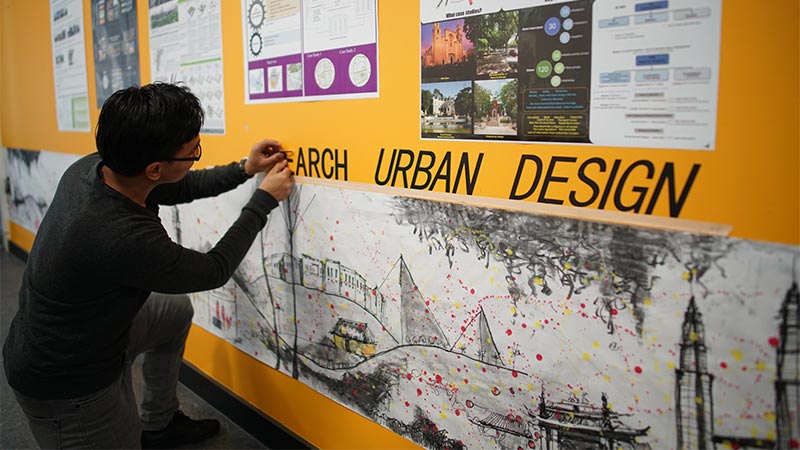Urban Design
MA or PGDip or PGCert
Start dates: September 2026
Full time: MA: 12 months, PGDip: 8 months, PGCert: 4 months. The full-time route is delivered 2 days per week.
Part time: MA: 24 months, PGDip: 20 months, PGCert: 8 month. The part-time route is delivered 1 day per week.
Location: Headington
School(s): School of the Built Environment
Overview
Many global challenges can be tackled through better city design. Urban designers play a vital role in shaping sustainable communities, from protecting green spaces to reducing travel times. At Oxford Brookes, you’ll study design from building scale to city-wide masterplans, exploring environments from villages to megacities.
You'll begin with UK housing, then expand your focus globally—engaging with experts in places like Dubai, or analysing population data from cities such as Hong Kong. You’ll explore how climate, density, and culture impact urban development.
Through a wide range of topics and a challenging international project—possibly in Manhattan or Mumbai—you’ll develop the creative and analytical skills needed to address urban design issues worldwide. We can’t promise you’ll solve every problem, but you’ll gain the insight and tools to make a real difference.

Why Oxford Brookes University?
-
Diverse community
On global challenges like these, international perspectives are vital. Meet staff and other students from a wide range of countries.
-
International projects
Each year, we select 6 cities around the world for our projects. You’ll learn their unique challenges and work out how to solve them.
-
The full spectrum of cities
Understand how increasing populations affect small towns as well as global megacities.
-
Work around your schedule
Classes are held on the same days each week (2 days a week full-time, 1 day a week part-time), so you can study alongside other commitments.
Course details
Study modules
The programme consists of 4 x 30 credit modules together with research methods and the dissertation or major project. The modules listed below are for the master's award. For the PGDip and PGCert awards your module choices may be different. Please contact us for more details.
Please note: As our courses are reviewed regularly as part of our quality assurance framework, the modules you can choose from may vary from those shown here. The structure of the course may also mean some modules are not available to you.
Research
Our teaching staff provide support for student research. They are actively involved in the following areas of research:
- Urban morphology for critical analysis and design
- Digital media and the teaching and learning of urban design
- Place-identity
- Urban Disaster Resilience
- Town Centre Management and Regeneration
- Urban intensification in the developing world
- Urban visions and policy mobility in Africa
- Live projects, urban labs and the enhancement of student learning experiences for UD and planning
- Plot-based urbanism and regeneration
- Landscape urbanism, biodiversity and the extinction of experience.
For more information visit Land Design and Development (LDD)
Careers
Many of our graduates find jobs before the course is over. That’s because they have extremely valuable skills in a growing area and are able to apply their knowledge to projects anywhere in the world.
Past students are working at organisations like:
- Arup
- WSP
- DLA
- EdgeUD
- Allies and Morrisson
- many UK city councils.
Some students decide to start their own companies, such as EcoResponsive Environments, founded by Oxford Brookes graduates. Others decide to apply their new skills in their current industry or continue their research at PhD level.
Related courses
Entry requirements
Specific entry requirements
The course is open to applicants who hold a 2.2 undergraduate honours degree (or international equivalent) in a related design & planning discipline.
We will actively consider applications from candidates with lower degrees or an alternative subject, who can provide a suitable portfolio and/or evidence relevant work experience.
Mid-career professional candidates with practice experience are also encouraged to apply.
Please also see the University's general entry requirements.
Please also see the University's general entry requirements.
English language requirements
If your first language is not English you will require a minimum IELTS score of 6.0 overall with 6.0 in all components.
OR
An equivalent English language qualification acceptable to the University.
Please also see the University's standard English language requirements.
Pathways courses for international and EU students
We offer a range of courses to help you meet the entry requirements for your postgraduate course and also familiarise you with university life in the UK.
Take a Pre-Master's course to develop your subject knowledge, study skills and academic language level in preparation for your master's course.
If you need to improve your English language, we offer pre-sessional English language courses to help you meet the English language requirements of your chosen master’s course.
English requirements for visas
If you need a student visa to enter the UK you will need to meet the UK Visas and Immigration minimum language requirements as well as the University's requirements. Find out more about English language requirements.
Terms and conditions of enrolment
When you accept our offer, you agree to the Terms and Conditions of Enrolment. You should therefore read those conditions before accepting the offer.
International qualifications and equivalences
How to apply
Application process
We advise applying in advance to secure places, and allow sufficient time for applications to be reviewed.
There is no formal application deadline (recruitment closes when teaching capacity is reached).
Applicants should also factor any time needed to meet offer conditions, arrange accommodation, and obtain a UK Student visa (if applicable).
Tuition fees
Questions about fees?
Contact Student Finance on:
Tuition fees
The following factors will be taken into account by the University when it is setting the annual fees: inflationary measures such as the retail price indices, projected increases in University costs, changes in the level of funding received from Government sources, admissions statistics and access considerations including the availability of student support.
How and when to pay
Tuition fee instalments for the semester are due by the Monday of week 1 of each semester. Students are not liable for full fees for that semester if they leave before week 4. If the leaving date is after week 4, full fees for the semester are payable.
- For information on payment methods please see our Make a Payment page.
- For information about refunds please visit our Refund policy page
Note for part time students: The per module fee relates to a twenty credit module. The programme consists of four thirty credit modules so the charge per module will be higher.
Financial support and scholarships
Additional costs
Please be aware that some courses will involve some additional costs that are not covered by your fees. Specific additional costs for this course are detailed below.
Programme changes:
On rare occasions we may need to make changes to our course programmes after they have been
published on the website. For more information, please visit our
changes to programmes page.



